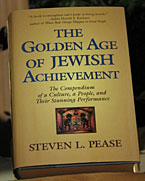The Measure of Their Achievement©
There are, perhaps, thirteen to fifteen million Jews in a world of six billion people. Jews are so few in number that in a room of 1,000 people representing the world's population, only two would be Jewish. A comparable sample from the United States would count only twenty-two Jews among 1,000 representative Americans.
In the sciences, Jews have won 22 percent of all the Nobel Prizes ever awarded - 29 percent of the prizes since 1950, after the Holocaust destroyed a third of their numbers. Given their small population, Jews should have earned only one of the 502 Nobels awarded for physics, chemistry, medicine and physiology. They have won 123.
The Fields Medal, awarded to the world's brightest mathematicians under age 40, is the honor John Nash, of the book and movie A Beautiful Mind had hoped to win. Instead, he took a Nobel Prize in economics as a consolation prize. One-fourth of the Fields Medals winners are Jews.
Encyclopedia Britannica provides its list of "Great Inventions." Of the 267 individual inventors, more than 13 were Jews, including Zoll (the defibrillator and the pacemaker), Land (instant photography), Gabor (holography), and Ginsburg (videotape). Jews are represented on the list 22 times more than one would expect based on their population.
They are disproportionately counted in most of the arts. Since their respective dates of inception, America's leading symphony orchestras have been led by Jewish conductors one-third of the time. They have created nearly two-thirds of Broadway's longest running musicals. Probably one-fourth of the greatest photographers of all time have been Jews, as have 10 percent of the world's great master architects. Of movie directors who earned Oscars, 38 percent were Jews. In broad artistic recognition, nearly 30 percent of the Kennedy Center honors and 13 percent of the Grammy Lifetime Achievement Awards have gone to them.
